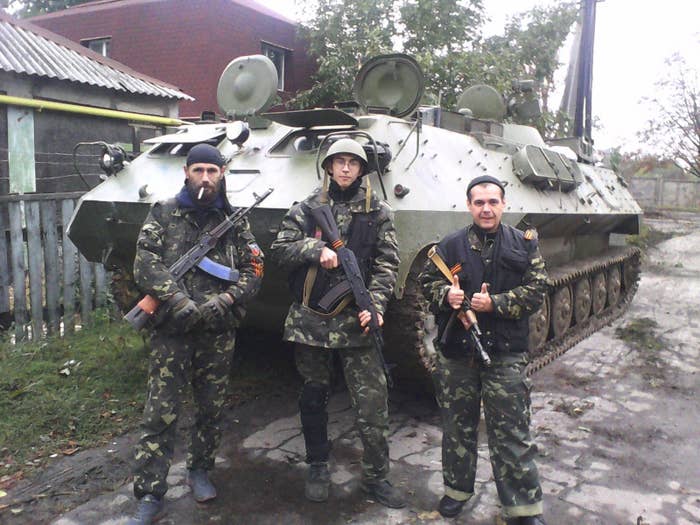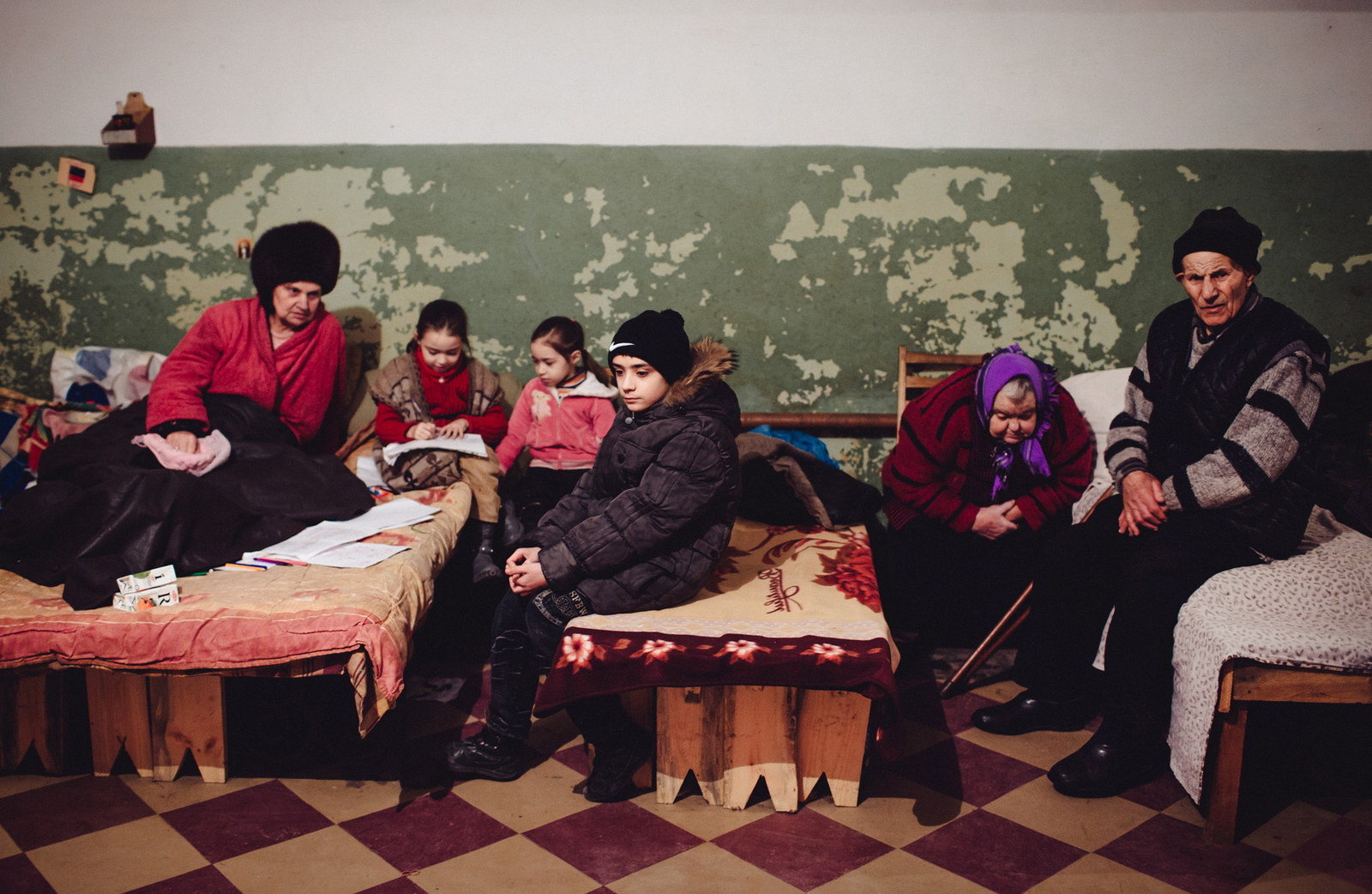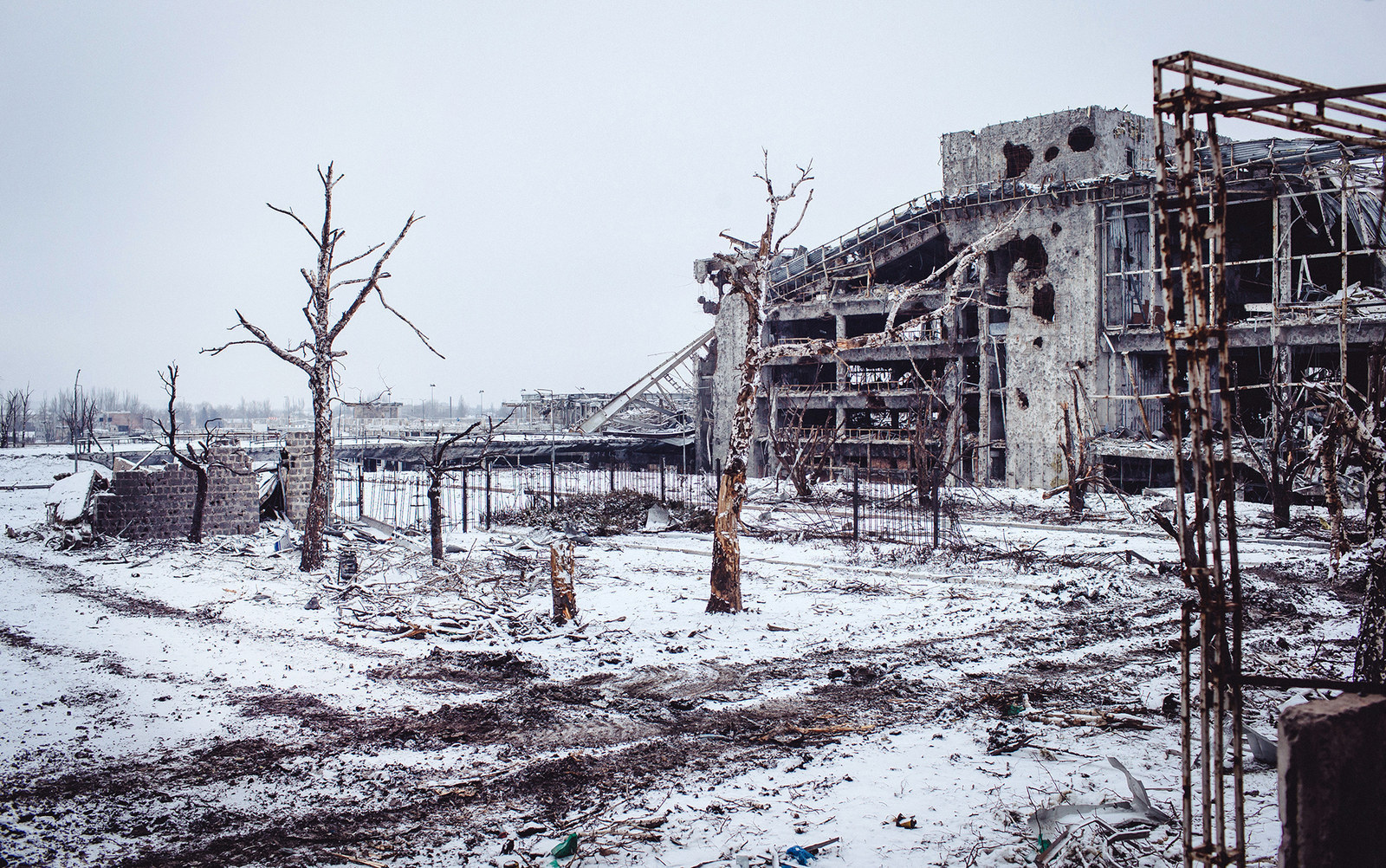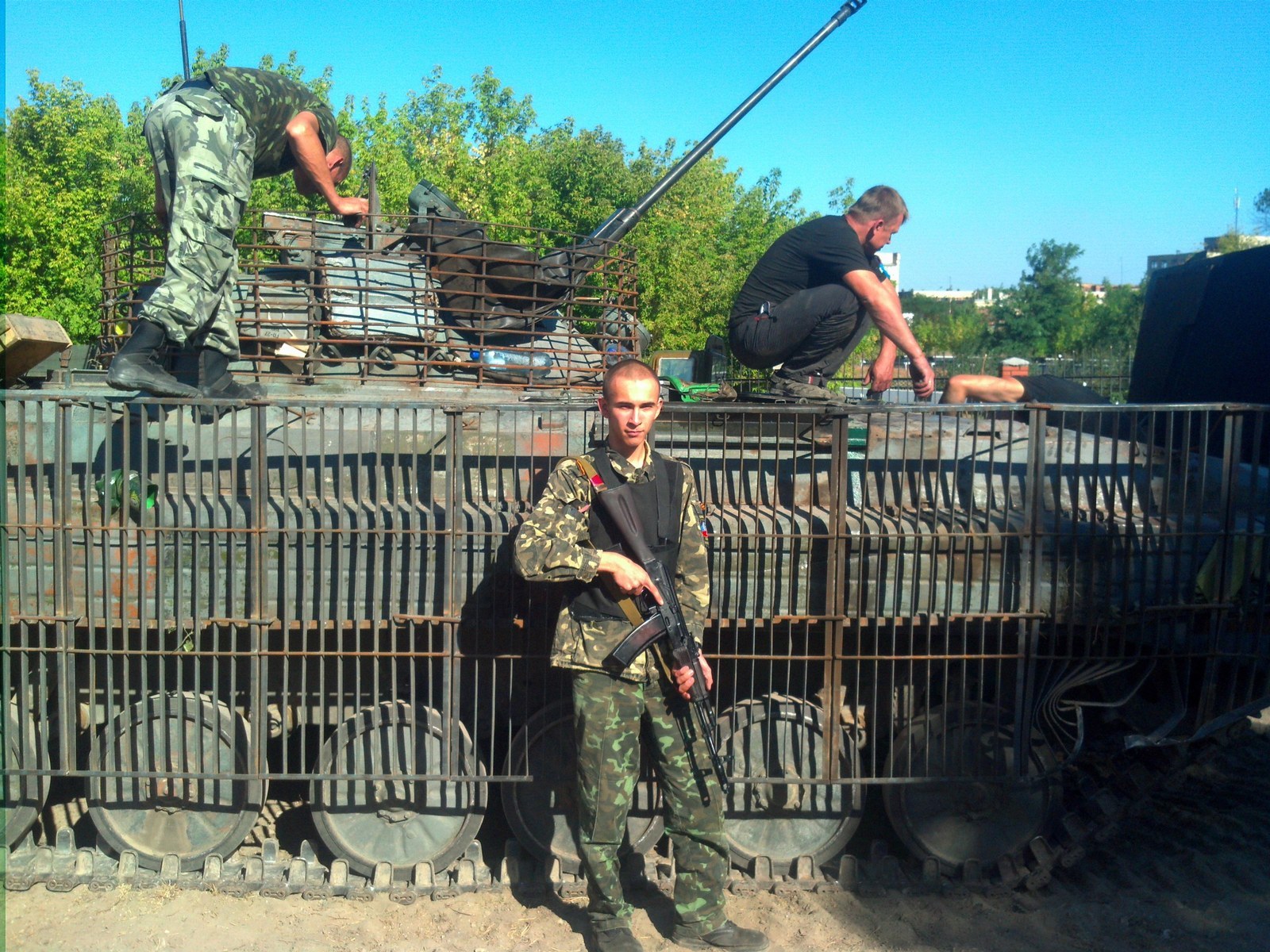
KHANZHONKOVE, Ukraine — School was out for summer, and Ukrainian artillery fire was creeping ever closer, so, after lengthy deliberations with his parents, Sasha Vasin joined the rebel militia. He was 15 years old. “I wanted to do it from the first day. I couldn’t look at people dying anymore,” he said.
There were volunteer fighters from almost every former Soviet country in Sasha’s division, the 15th International Brigade of the self-proclaimed Donetsk People’s Republic. The leaders were from Abkhazia, a separatist enclave that broke away from Georgia in 2008 after that country fought a short war with Russia over another enclave, South Ossetia. Many now see the five-day conflict as a dress rehearsal for the brutal 10-month conflict in east Ukraine. The fighters gave Sasha a uniform and taught him to shoot a Kalashnikov.
Some of his comrades at the barracks, an abandoned municipal building in the suburbs of Donetsk, were just a year or two older than he was. After their base came under Ukrainian artillery fire one day last August, sending the ceiling in the cafeteria crashing down on them and turning cars in the parking lot into charred wrecks, they crawled up from the basement and shouted “You missed!” into the sky.

The fighters sent Sasha to fight for Donetsk’s airport, a symbolic prize that became a graveyard for hundreds of Ukrainian soldiers and rebels as they reduced it to rubble last fall. He emptied round after round at Ukrainian soldiers in the distance, never really knowing if he’d been the one who made them fall. He cowered on the ground from tank and artillery fire.
“At first it was difficult,” he said. “But then you get used to it, and stop paying attention. And then you want it more.”
His father, Vasily Vasin, who works in the Economic Development Ministry of the Donetsk People’s Republic, the largest of two unrecognized rebel states in east Ukraine, said he tried to talk him out of it several times. “But he was just so set on it internally.”
The stories of people like Sasha Vasin show how Ukraine’s central government has a far tougher task ahead than just winning back territory. In the very areas Ukraine is fighting to regain, near-constant artillery bombardment and a crippling economic blockade have hardened attitudes to the point of no return. Almost every day, shelling claims the lives of civilians: someone’s mother, husband, child. And every day, reconciliation between millions of Ukrainian citizens here and the Ukrainian government seems even further off.
A new cease-fire deal agreed on Thursday has raised hopes that Ukraine may be able to quell its war with Russian-backed rebels at last. In the last 10 months, the war has killed over 5,400 people, displaced a further million, and devastated large parts of Ukraine's two easternmost provinces, once the country’s industrial heartland.

Valentina Potemkina spends her days inside a basement bomb shelter in Donetsk’s Kievsky neighborhood looking after her 6-year-old twin granddaughters, Sofia and Rada Zinyuk. “What are we fighting for?” she asked them on a recent Tuesday. “Novorossia!” they chimed back in unison, using a Tsarist-era name for Ukraine’s Russian-speaking southeast that was adopted by the separatists after Vladimir Putin revived the term last year. “They already know how to tell different kinds of artillery apart,” Potemkina said as the girls giggled between themselves, drawing My Little Ponies in crayon on one of 50 cots in the shelter.
The shelter is an old Soviet “civil defense” facility built during the Cold War to protect citizens from weapons of mass destruction. Hand-painted signs on the walls offers instructions on what to do in case of a nuclear explosion, a chemical weapons attack, an electromagnetic pulse, or if someone falls victim to “the biological weapons of capitalist countries’ armies.” The 50 people who live in the shelter are hiding from far less advanced weapons — retrograde artillery and rocket fire, which Human Rights Watch has accused both sides of using indiscriminately in civilian areas.
"Everyone here is against Ukraine. When you hear the cannonade, you look at things differently."
Officials in Kiev say that the rebels are doing all the shelling to discredit Ukraine. In Donetsk, that line has about as much credibility as Moscow’s denials its troops are fighting alongside the rebels do in Western capitals. “Everyone here is against Ukraine. When you hear the cannonade, you look at things differently,” said Ekaterina, a 20-year-old woman who declined to give her last name for fear of being expelled from the Ukrainian university where she is completing her studies online. “You don’t have to be a soldier to see where they’re firing from.”
The shelling is only one danger facing pensioners like Potemkina: They also face destitution and starvation. After it became clear last fall that Ukraine had little hope of regaining the rebel republics quickly despite a shaky cease-fire deal, Kiev cut off all state financial support for the area. The move was an attempt to call Russia’s bluff and force it to support the unrecognized rebel republics, whose leaders admit the region is not remotely economically viable alone. Instead, it disproportionately targeted the elderly, poor, and vulnerable. Potemkina must now travel to Ukrainian-held territory to get her pension. The trip can take days, thanks to an onerous new pass system instituted by Kiev — not to mention the frequent fighting that plagues the only four open exit points. Though the new cease-fire deal calls upon Ukraine to restore benefits and public workers’ salaries in the east, the uptick in fighting since its conclusion suggests things may well never come to that.
Part of the decree also saw Ukraine establish a de facto state border, complete with customs and passport control, which has made it vastly more difficult to deliver medical supplies. Donetsk’s Kalininsky hospital, the largest in the region, only has enough supplies to continue treatment for its 90 dialysis patients for two weeks, maybe four, according to doctors there. They will all die unless a new shipment comes. “These patients haven’t gone anywhere because nobody cares about them,” said Ivan Plokhotnikov, the hospital’s deputy chief doctor. “It’s artificially denying people a chance at life.”
Despite losing all of its funding, the Kalininsky hospital has managed to retain most of its staff. Those who left have been replaced by employees of other hospitals in smaller towns that have been damaged by shelling. Their workload, too, has shot up: About 1 in 4 patients admitted since the rebels started an offensive in January are war victims, predominantly with shelling injuries, Plokhotnikov said.
“It’s basically unreal to leave, because our patients are here,” said said Viktor Denisov, who runs the dialysis ward.
The doctors aren’t the only people in Donetsk attempting to maintain a sense of normalcy. The city, which had a prewar population of 1 million, is now at its most active since last summer, when hundreds of thousands of mostly middle-class residents fled. There are more cars on the streets. Restaurants shut for months are open again, serving duck, spinach and Italian wine. So are many stores selling durable goods like light fittings, refrigerators, and plasma TVs.
Many residents to whom BuzzFeed News spoke said they left during the summer as fighting intensified, then returned after finding that being from Donetsk province made it almost impossible to get a job or rent an affordable apartment elsewhere in Ukraine. “People said we shouldn’t say where we were from,” said high school student Alexei Kasyanov, who spent the summer in the Ukrainian-controlled city of Berdyansk.
The war has exacerbated long-standing dislike of Ukraine’s east, which is seen as having enabled its longtime don, corrupt pro-Russian ex-President Viktor Yanukovych, and holding back Ukraine from moving toward the West. Even Petro Poroshenko, elected president last year vowing to bring peace and reconciliation after Yanukovych fled to Russia, has indulged in the rhetoric. Last year, he told a crowd in Odessa that “our children will go to school and kindergarten, and their children will sit in basements.” The remark was replayed heavily on Russian-language television and became a byword for Kiev’s supposed contempt for the east.
The spite that they face from the rest of Ukraine has only made residents of Donetsk more resilient, they say. Artillery onslaughts have become communal affairs. Children paste drawings of apartment buildings being shelled onto the walls of bomb shelters. Neighbors who barely knew each other before take refuge in their apartment halls, share bottles of wine, and talk until the barrage subsides. “The last time we were shelled in August, there were 5 people in my stairwell. Now everyone’s back — that’s 80 people,” said Enrique Menendez, who runs a volunteer group in Donetsk. “I didn’t know any of my neighbors before, nobody at all. And now I know all their pets’ names.”

Rebel officials are trying to translate that communal spirit into support for their cause. Schools devote 15 minutes a week to “political information lessons,” a revival of an old Soviet practice where children were given state-mandated takes on the news. The exploits of Communist Party officials, chess players, scientists, and explorers have been replaced by those of famous rebel warlords, people with names like Givi, Motorola, and Ataman Ivanych.
“These are already our new heroes whose names we will use to bring up the next generation,” said Igor Kostenok, the Donetsk People’s Republic’s education minister. “The children have absorbed this already,” he added. “They don’t just know them, they play at them.”
The lesson in Tatiana Prussova’s 11th-grade English class, held in the town of Khartzysk on Wednesday, was, however, more prosaic. Rebels were closing in on Ukrainian troops in the strategically important city of Debaltseve. Several civilians died during shelling in Horlivka. The forthcoming cease-fire talks in Minsk were a crucial opportunity to stop the U.S. entering the war. Russova turned away from the PowerPoint presentation that had been sent by the rebels’ Education Ministry and turned to face the class.
“Does the 8th of February have significance for any of you?” asked Russova, a matronly woman in her forties wearing a brown pantsuit and sporting bouffant black hair. “It’s the Day of the Young Anti-Fascist. We remember the young heroes who gave their lives during military conflicts,” she said. Had any of them heard of young people fighting for their country today? There was that one boy who joined the militia after his parents were killed, she said. And there were the two young martyrs who died before they left school, known only as The Greek and The Partisan. The class nodded quietly, then headed to the next period.

In October, Sasha Vasin, the rebel child soldier, went back to school. He’s one of the lucky ones: He saw several of his brigade comrades die, including a close childhood friend. He’s 16 now, and planning to go to a Russian military academy in the Russian city of Ryazan when he finishes high school. His camouflage, which usually sits awkwardly on his skinny, still-developing frame, still hangs in the closet in his house in Khandzhonkove, which he shares with his parents and four siblings.
On Tuesday evening, the extended Vasin family gathered at home to celebrate the 21st birthday of Sasha’s sister, Evgenia. The dining table was covered with a spread of Russian comfort food. The men drank vodka, and the women white wine. With the Apple products in the study, the rows of books and DVDs, and the well-appointed kitchen, it could have been any normal middle-class house in Ukraine, or anywhere else.
“Everyone looks at things differently these days,” Sasha’s father said. “When there’s a war on, you have to live for the moment.”
For a school project, Sasha has made a 14-minute film documenting the history of the struggle for the Donetsk airport. It weaves in mobile-phone footage from the battlefield with cheap-looking titles and moody Russian power ballads. Shots of Ukrainian forces are overlaid with newsreel tape of Nazi advances into eastern Europe, a Nazi marching song, and the Nazi flag. The Donetsk People’s Republic education ministry gave it first prize in a contest to find the best artistic interpretation of the war.
“Our story of the Great Patriotic War tells us that many children who were forced to grow up early because of the war took up arms and defended their home,” said Kostenok, the education minister, using the Russian term for World War II. “History is doomed to repeat itself.”
